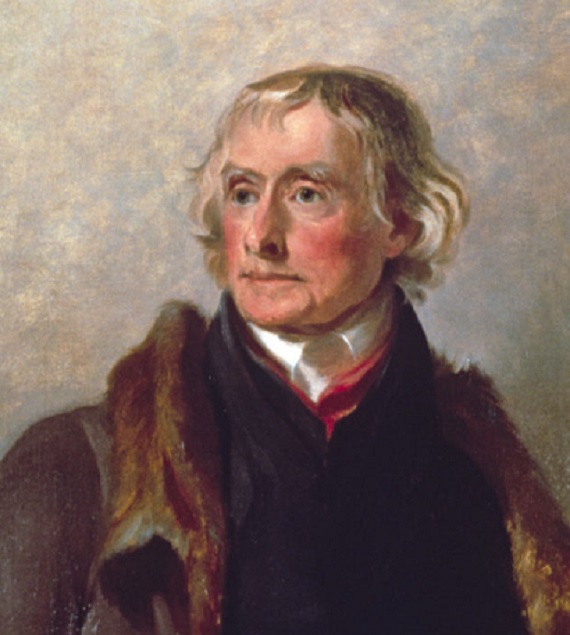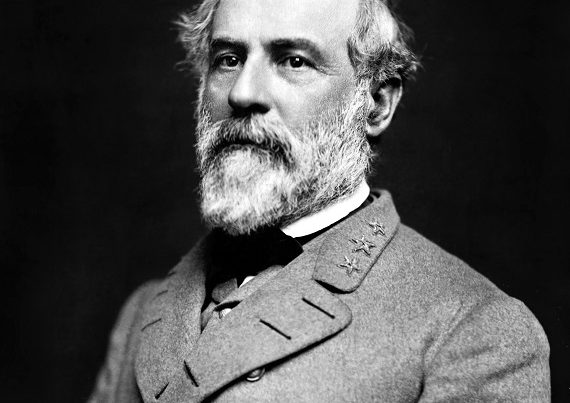
To the student of the Classics the most interesting thing in the Library of Congress at Washington is the considerable remnant of the library of Thomas Jefferson. On October 6, 1820, Jefferson wrote to his young grandson, Francis Eppes, “I consider you as having made such proficiency in Latin and Greek that on your arrival at Columbia you may at once commence the study of the sciences.”
In his home at Monticello Jefferson had a library of six thousand choice volumes, the product of nearly every press since Aldus, which he had been collecting for fifty years. Two thousand of these books remain to us in one place. From them we know his linguistic habits; and there is no better demonstration anywhere that mastery of our own tongue is best achieved by knowledge of the literature of two thousand years ago. When the British raided Washington in 1814, they took particular pains to burn the Library of Congress. Ex-President Jefferson promptly offered to sell his library to Congress to replace the lost one.
In a letter to Dr. Thomas Cooper, January 16, 1815, he described his library as probably the best chosen collection of its size in America. There were some members of that Congress who did not appreciate the pearls before them.
Cyrus King of Massachusetts said:
It might be inferred, from the character of the man who had collected the library, and of France, where the collection was made, that it contained irreligious and immoral books, works of the French philosophers, who caused and influenced the volcano of the French Revolution, which had disrupted Europe and extended to this country. He was opposed to the general dissemination of that infidel philosophy, and of the principles of a man who had inflicted greater injury on our country than any other man except Madison. . . . The bill would put into Jefferson’s pocket $23,900 for about six thousand books, good, bad and indifferent, old, new and worthless, in languages which many can not read, and most ought not.
But the majority of both House and Senate favored the purchase, and the bill passed. It was approved by President Madison, January 30, 1815. The books were catalogued, packed in boxes, and carried in wagons from Monticello to Washington. Mr. Jefferson received $23,950.
Undoubtedly the best known volume in this collection is the compilation which Jefferson named The Life and Morals of Jesus of Nazareth, and which is better known as Jefferson’s Bible. He took certain portions of the New Testament and pasted on blank sheets, in parallel columns, the text in Greek, Latin, French and English. These sheets he had handsomely bound in red morocco. Within the present century Congress has had a photolithographic facsimile of this compilation published as a public document.
Mr. Jefferson had a great fondness for parallel column or interpage translations. There are scores of them in Greek- Latin, Latin-French, and Latin-English. Often the two versions are in different prints. The Greek is sometimes on a page with the margin trimmed off. One of the volumes of Diodorus Siculus has the following explanation written on the fly-leaf:
Note: This is the editio princeps of Diodorus, published in 4, but made to appear 12 by cutting off the margin. Mr. Jefferson interleaved it with the corresponding books of Lauren Rhodoman’s Latin version, published at Hanau, by Urchel, d, in 1611. F. Vinton.
So also of many others Mr. Jefferson had patiently taken volume after volume, and, where he could do no better, had torn off the covers, and interpaged, as nearly as he could, the Greek and the Latin, or the Latin and the English. There is even a Caesar’s De Bello Gallico, interpaged with a translation of it into Greek.
On Christmas eve, 1851, there was a fire in the old library in the Capitol, by which four thousand volumes of the Jefferson collection were destroyed. Two thousand volumes were in another room and were uninjured. A catalogue was printed in I8I5, SO that we know just what the collection originally contained. There were many hundred law books, in English, French, and Latin; works on medicine, chemistry, agriculture, religion, philosophy, politics, ancient and modern history, and, above all, the Classics.
There were ten editions of Homer’s Iliad and four of the Odyssey; six editions of Vergil, four of Anacreon, three of Ovid, five of Horace, seven of Juvenal; six editions of Lucretius, all of them the finest specimens of old printing and binding; five editions of Euripides, three of Sophocles, three of Plautus, four of Cicero. About the only Latin author he missed was Catullus. Of works in Greek and Latin interpaged there were the Iliad, Aesop, Aristotle; Charitonis Aphrodisiensis de Cherea et Callirhoe Amoribus; Coluthi Raptus Helenae; Longi Pastorales de Daphnide et Chloe; Lycophronis Cassandra;. Phaedrus, Xenophontis Ephesii Amores Anthiae et Abrocomae (Greek, Latin and Italian); Anacreon (four editions), Ausonius, Callimachus, Pindar, Theocritus, Tyrtaeus, Herodotus; Historiae Poeticae Scriptores Antiqui, Apollodorus, Conon, Ptolemaeus Hephaestos, F. Parthenius, Anto nius Liberalis; Josephus (three editions in Greek and Latin), Polybius; the complete works of Xenophon; and Zosimus.
One little book in the collection is a compilation called Thoughts of Cicero, consisting of selections in Latin with parallel English, and with an Introduction translated from the French of the Abb6 d’Olivet, published in Glasgow in 1754. This Introduction contains the following on the selection of Latin for study in School:
I can never forget what happened to me once, as I was engaged in a party for a walk to twelve or fifteen miles from London. Being obliged by bad weather to take shelter in the first house that presented itself, I was agreeably surprised to find it inhabited by a Frenchman whom I had known in my youth, and who, after various adventures, had procured himself this retreat, where he made a livelihood by boarding child ren, to whom he taught the French language. I had the curiosity to learn what was the method followed in this sort of schools, which are common enough in England. I found that they read Quintus Curtius, with Vangelas’s translation, and that by the help of the Latin, the rudiments of which the children must previously be acquainted with, the master endeavored to make them understand the French; which served at once to exercise them in both languages. In the midst of our conversation the father of one of the boarders joined us. Some words, which in the way of discourse he directed to me, gave me occasion to tell him that I should be glad to hear his son explain a page or two, at dipping into the book, and where should the book open but at the battle of Arbella! But far the boy’s explanation had not proceeded, before the English gentleman, the father, interrupted it, by reflections that gave rise to this little collection. After all, says he, what reason is there that my son should have his head filled with all these wars? I have no thought of making him a general.
And then the good Abbe went on and explained that this conversation gave him the idea of making a bilingual book, containing maxims and moral reflections, in Latin and the equivalent French. So he selected some Thoughts of Cicero, his first choice being:
Quid potest esse tam apertum, tamque perspicuum, cum coelum suspeximus, coelestiaque contemplati sumus, quam esse aliquod numen praestantissimae mentis, quo haec regantur? Quod qui dubitet, haud sane intelligo, cur non idem sol sit, an nullus sit, dubitare possit. Quid enim est hoc illo evidentius?
Loosly translated: [What can be more open, more obvious, by looking up at heaven and contemplating that there is some higher power that these are controlled? If a man doubts, not in the sense I understand, why is it not the same sun, or whether there is no doubt about it. What is the evidence?]
The unusual interest taken by Jefferson in languages other than English is shown by the fact that in his library were Ainsworth’s Latin-English Dictionary, Calepini Dictionarium XI Linguarum, Clarke’s Latin Grammar, Moor’s Elementa Linguae Graecae, Erpenii Rudimenta Linguae Arabicae (I628); an Index Homericus; Etymologium Magnum Graecum; Glos sarium Mediae et Infimae Graecitatis; Holmes’s Greek Grammar; Julli Pollucis Onomasticon; Lingua rum Veterum Septentrionalium Thesaurus Hickesii; Littleton’s English-Latin, Poetical, Historical, Geo graphical, and Latino-barbarous Dictionary; Lilly’s Latin Grammar; Linguarum Totius Orbis Vocabularia a Pallas; Lye’s Dictionarium Saxonico- et Gothico Latinum, ab Owen Manning; Meursii Glossarium Graeco-barbarum; Minshien’s Guide to the Tongues; Oratio Dominica in Diversas Linguas Versa; the Port Royal Greek Grammar; Ross’s Latin Grammar; Ruddiman’s Rudiments of the Latin; Sennarti Chaldias mus et Syriasmus; Spinosae Grammatica Hebraica; Stephani Thesaurus Linguae Latinae; Cooper’s Thesaurus Linguae Latinae; Vocabulaires Compares des Langues de toute de la Terre, par Pallas; Wetstenii Orationes de Linguae Graecae Pronunciatione, etc.
There is one little pocket Cicero, containing De Officiis, De Senectute, De Amicitia, and Paradoxa, which shows more wear of the pages than any other of the two thousand volumes that remain. There are some volumes three hundred years old, bound in white vellum with gilt omamentation, which the binders of the Library of Congress say are the original covers. They are yet in fine preservation. So much for the durability of the acid-free tanning done in the sixteenth and seventeenth centuries. For the best bindings to-day the Library gets its acid-free moroccos from the Cape of Good Hope. They are not made in the United States.
The print-shops of a hundred years have poured forth an ever-rising flood. The typography of to-day is delightful to the eye. There are ten thousand things to write about of which Jefferson never heard or dreamed. Yet as you sit in the quiet room in the Library of Congress where Jefferson’s books rise tier on tier in their perpetual youth, the one dominating thought that grows on you is that he did not miss much of what is worth while, and that in the world of thought and expression there is very little new.
A host of young words, descriptive of thousands of new things and new actions, have swarmed into being since Jefferson died. A man of 1820 who knew English and no other language could make little sense of to-day’s newspaper. He would have to learn the language over again. But to Jefferson, who knew Greek, Latin, and French, most of the new-born words would be suggestive, if not entirely descriptive, for he knew the sources from which these new words were derived.
This piece was published in The Classical Weekly, Dec 4, 1916.






